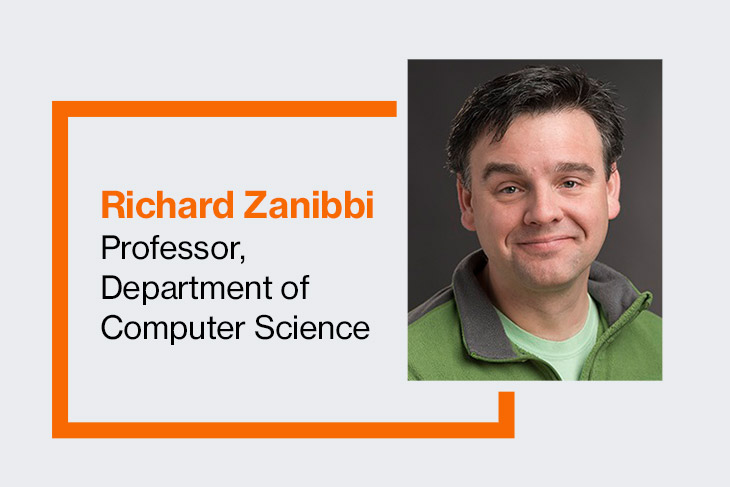RIT professor joins $20 million NSF project to advance chemical synthesis using AI
Machine learning expert Richard Zanibbi joins team to create NSF Molecule Maker Lab Institute
As part of a new $20 million National Science Foundation grant, RIT computer science professor Richard Zanibbi is using artificial intelligence to accelerate experimentation in chemistry, including finding more efficient ways to create solar cells.
As part of a new $20 million National Science Foundation grant, RIT computer science professor Richard Zanibbi is using artificial intelligence to accelerate experimentation in chemistry, including finding more efficient ways to create solar cells.
Zanibbi is joining an interdisciplinary team, led by University of Illinois at Urbana-Champaign (UIUC), to create the NSF Artificial Intelligence (AI) Institute for Molecular Discovery, Synthetic Strategy and Manufacturing — or the Molecule Maker Lab Institute (MMLI). The MMLI is one of five new AI institutes established by the NSF to accelerate research, expand America’s workforce, and transform society in the decades to come.
The institute will focus on developing new AI-enabled tools to accelerate automated chemical synthesis and advance the discovery and manufacture of novel materials and bioactive compounds. Researchers will use data generated from the analysis of these molecules to guide further development of synthesis planning and catalyst design tools using AI and machine learning.
“We’re essentially creating a system that can analyze existing chemical research literature, find patterns that emerge and guide scientists on which experiments should be considered next,” said Zanibbi. “By using AI, we can get a global view of the chemistry literature and then try to use this to make new discoveries faster, more safely, and more effectively.”
A key application for the system — called AlphaSynthesis — is finding more reliable ways to create solar cells. Zanibbi and his team will also create a search interface that allows scientists and others to search information distilled from research papers, using chemical formulas, chemical reactions, and keywords.
Zanibbi was invited to join as a remote member of the team due to his expertise in document recognition and information retrieval, specifically related to mathematical notation and search.
“It’s motivating that we can use AI to help create cleaner energy and hopefully make the world a better place,” said Zanibbi. “It’s a genuine honor and pleasure to work with this team, and I’m really looking forward to being involved in the project.”
The NSF grant will help fund Ph.D. student researchers in Zanibbi’s Document and Pattern Recognition Lab in RIT’s Golisano College of Computing and Information Sciences.
“As a national research university, RIT is proud of Professor Zanibbi and very pleased to have the opportunity to contribute to this important effort to strengthen and solidify our nation’s leadership in artificial intelligence,” said Ellen Granberg, RIT provost and senior vice president for Academic Affairs. “Being invited to participate in this consortium is a testament to our faculty’s expertise and reflects on investments that RIT and its government partners have made in strategic research areas, including AI. We look forward to a successful collaboration with the University of Illinois and the other university partners.”
The five-year grant is led by Huimin Zhao, Steven L. Miller Chair professor of chemical and biomolecular engineering at UIUC. It includes researchers and collaborators from RIT, UIUC, University Laboratory High School, Ulsan National Institute of Science and Technology, Northwestern University, and Penn State University.
“The MMLI is a first-of-its-kind research infrastructure that will have a powerful impact on the U.S. research community,” said Zhao. “This proposed infrastructure will respond to high-priority needs of communities seeking to discover and optimize a wide range of molecular functions; harness the power of data to advance the science of molecular synthesis; and inspire a broad audience of scientists, teachers, students, and citizen scientists to participate in the process of molecular innovation.”
The institute also aims to serve as a training ground for the next generation of scientists with combined expertise in AI, chemistry, and bioengineering.
“The MMLI will revolutionize the way chemistry is taught and capture the imagination of a new generation of molecule makers,” Zhao said.
With an investment of over $100 million over the next five years, NSF’s Artificial Intelligence Institutes represent the nation’s most significant federal investment in AI research and workforce development to date. Enabled by sustained federal investment and channeled toward issues of national importance, continued advancement in AI research holds the potential for further economic impact and improvements in quality of life.
“Recognizing the critical role of AI, NSF is investing in collaborative research and education hubs, such as the NSF MMLI with collaboration from RIT, which will bring together academia, industry, and government to unearth profound discoveries and develop new capabilities advancing American competitiveness for decades to come,” said NSF Director Sethuraman Panchanathan. “Just as prior NSF investments enabled the breakthroughs that have given rise to today’s AI revolution, the awards being announced today will drive discovery and innovation that will sustain American leadership and competitiveness in AI for decades to come.”
To learn more about the NSF AI Institute for MMLI, go to moleculemaker.org.










